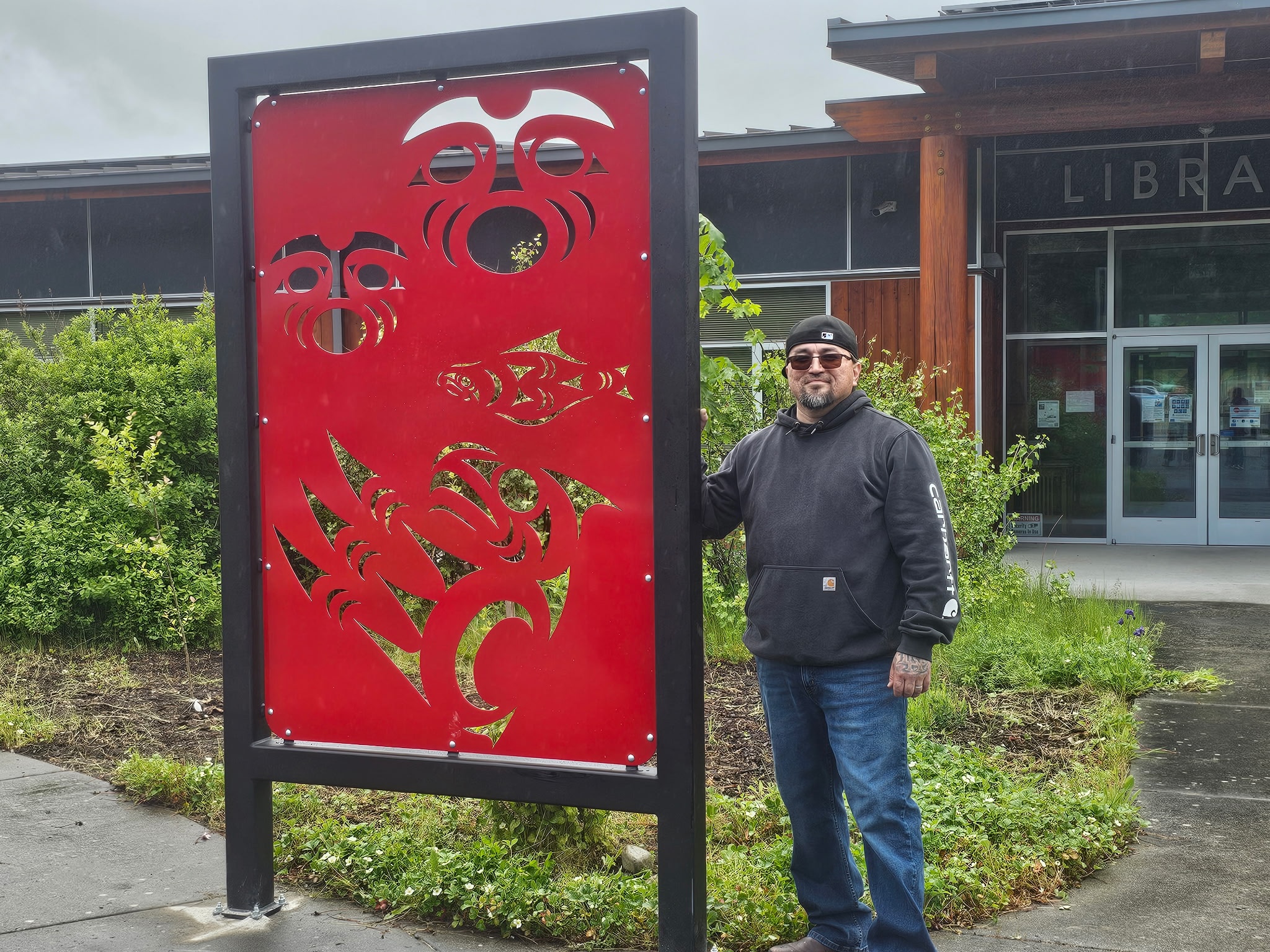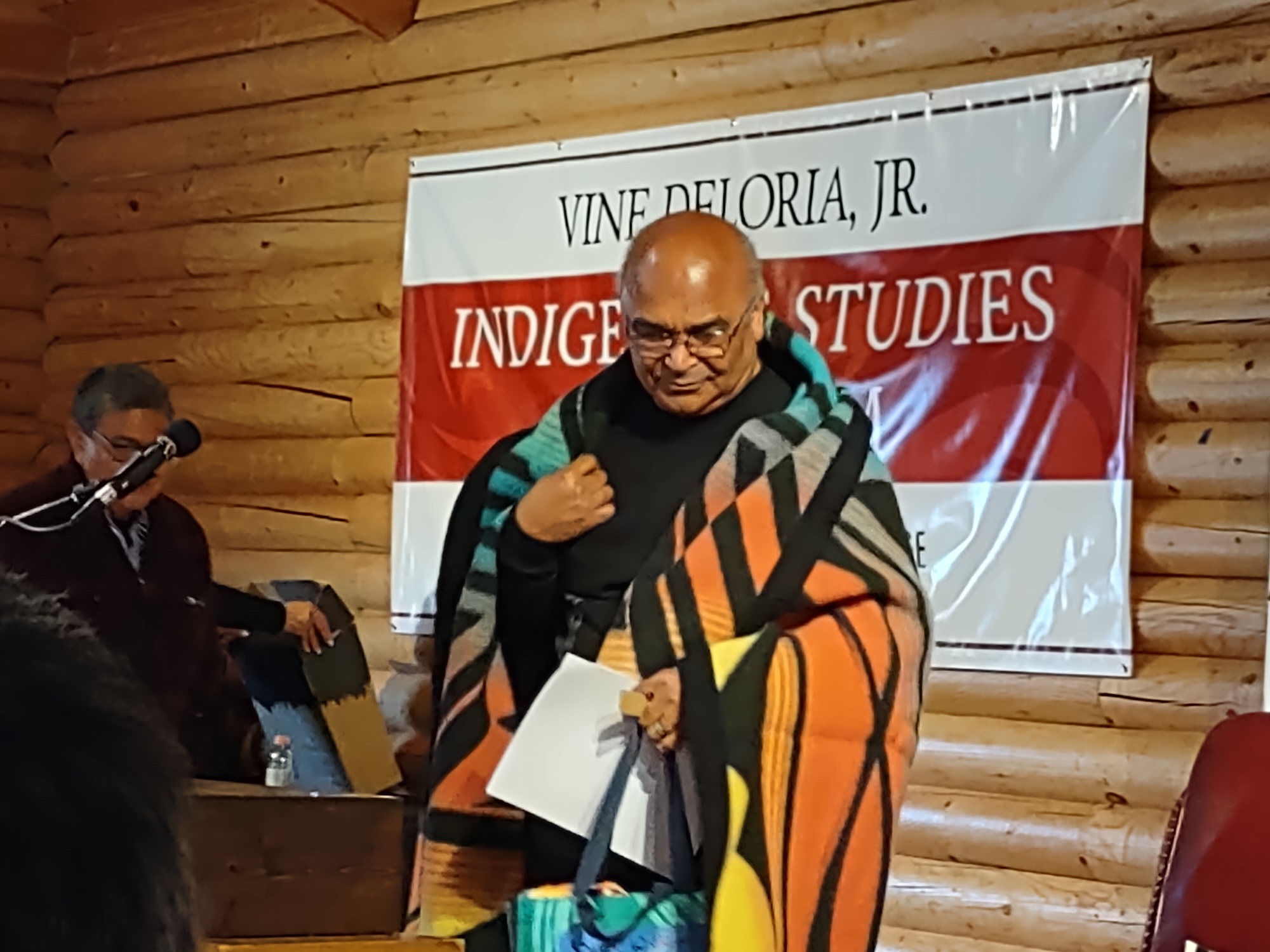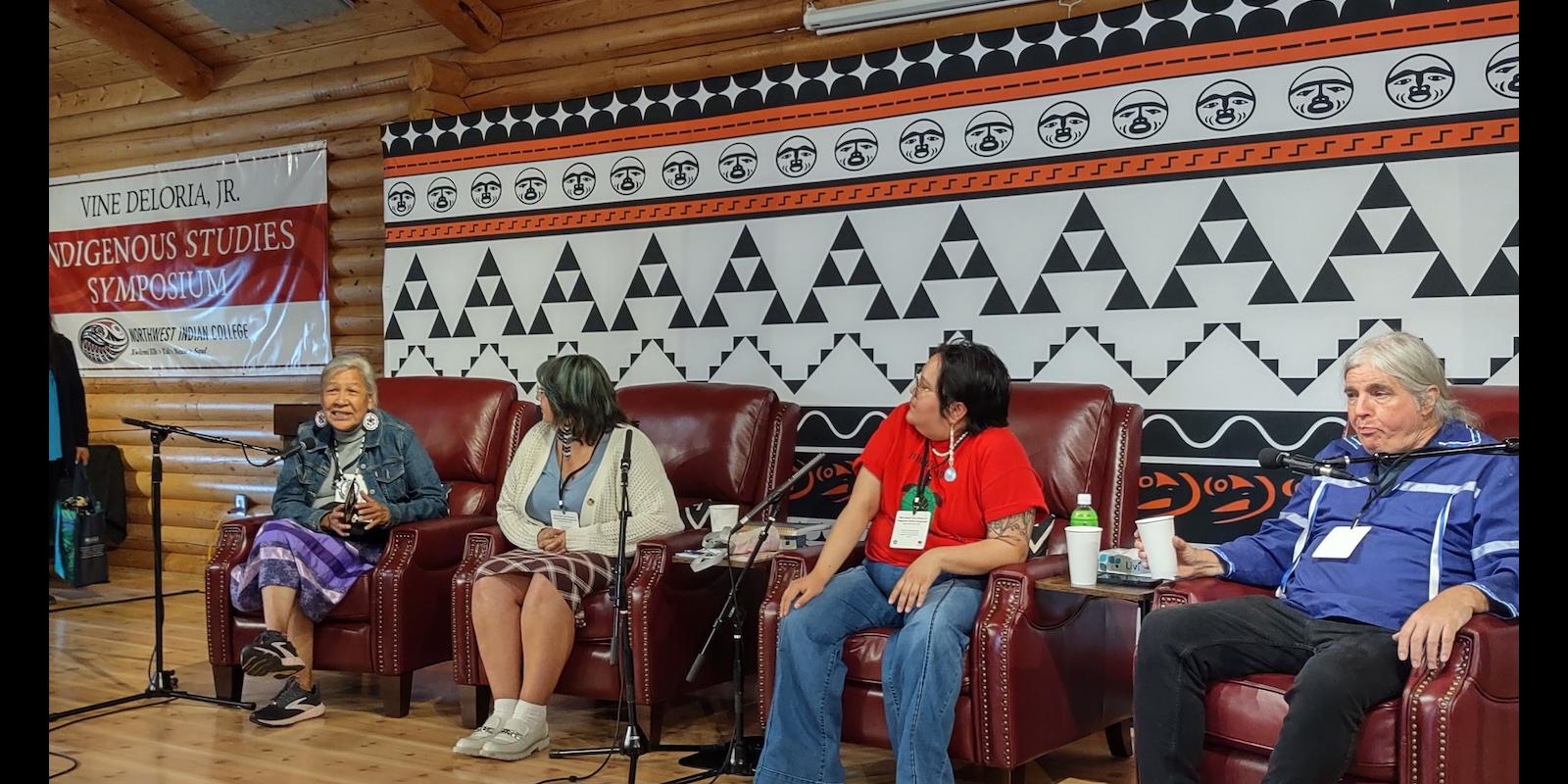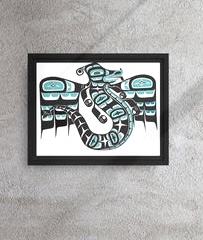The 20th Annual Vine Deloria Jr. Indigenous Studies Symposium was scheduled for May 22-23, 2025, at Northwest Indian College on the Lummi Nation, marks a significant milestone in the ongoing celebration of one of America's most influential Indigenous intellectuals. This year's theme, "The World We Used to Live In: Upholding Our Duty to Past and Future Generations in the Fight for Indigenous Sovereignty," draws directly from Deloria's 2006 book and emphasizes the intergenerational responsibility to preserve Indigenous knowledge and continue the struggle for sovereignty.
 On May 22, 2025, a beautiful gathering of attendees experience a walking tour of the new installation and discussion by Lummi/Nooksack artist Jason LaClair about his first fabricated metal sculpture newly installed outside the Northwest Indian College Library. The installation was installed in honor of the this annual symposium just 4 days prior to the event.
On May 22, 2025, a beautiful gathering of attendees experience a walking tour of the new installation and discussion by Lummi/Nooksack artist Jason LaClair about his first fabricated metal sculpture newly installed outside the Northwest Indian College Library. The installation was installed in honor of the this annual symposium just 4 days prior to the event.
In closing on the second day of the 20th annual Vine Deloria Jr. Symposium, a fantastic panel from Indigenous Environmental Network engaged in discussions around the impacts of current policies on environmental protections efforts and the correlation to intentionally eroding trust and treaty obligations. The panel included Mary “Missy” Crowe (Meli Koga), (Eastern Band of Cherokee), Michael Lane, Indigenous Sovereignty Advocate, Brenna Yellowthunder (Ho-Chunk, Navajo, Standing Rock), Jordan Harmon (Muscogee Creek Nation).
David E. Wilkins (Lumbee Nation) of the University of Richmond referred to Vine Deloria's 'Metaphysics of Modern Existence' as he listed in detail intentional steps Indigenous communities can take to navigate an uncertain future. He spoke of self-sufficiency referencing the Mohawk concept of "tewatatowie" meaning "we help ourselves." Intertribal interdependence was centered as being key to a "mature" path for the survival of all Indigenous peoples as the country is challenged with a democracy in collapse. In this spirit, Dr. Wilkins urged Intertribal connection and cross pollination with the creation of new Intertribal treaties and legal systems. Within this plan was the discussion of the growth and expansion of foodways and energy resources.

The 2025 symposium continues to bring together scholars, elders, activists, students, and community members in what has become one of the most significant annual gatherings in Indigenous academia. While specific presenter names for the 2025 event are still being finalized, the symposium promises to continue its tradition of featuring prominent voices in Indigenous scholarship and activism. The event includes free registration (both pre-registration and on-site), and overflow seating with closed-circuit live streaming will be available on campus to accommodate the expected large turnout for this anniversary celebration.
Origins and Vision
The symposium's origins trace back to the 2005 Robert K. Thomas Symposium at Northwest Indian College, where Vine Deloria Jr. delivered what would be one of his final public presentations as the plenary speaker. Following this event, Deloria expressed his desire to make the college the site of a yearly symposium in Indigenous Studies. Less than four months later, on November 13, 2005, Deloria passed away, but his vision lived on through the dedication of Northwest Indian College and symposium co-coordinator Steve Pavlik, who studied under Deloria at the University of Arizona.
The inaugural symposium in 2006 established the framework that would guide the event for the next two decades: intellectually driven panels focusing on areas central to Deloria's work, including traditional knowledge, federal Indian policy, treaty rights, Indigenous philosophy, and the natural world. True to Deloria's spirit, the symposium has maintained a unique requirement that presentations avoid PowerPoint and electronic presentations, instead emphasizing oral tradition and direct engagement.
Jason LaClair
"Dragon Northwood"
Framed canvas print
Over the Years
Throughout its 20-year history, the symposium has attracted some of the most respected figures in Indigenous scholarship and activism:
Early Years
The fourth annual symposium (2009) featured an impressive lineup including:
- Barbara Lane, the brilliant anthropologist who served as an expert witness for Northwest Coast tribes in the seminal Boldt fishing rights litigation
- Walt Lara of the Yurok Nation, who discussed his key role in the Northwest Indian Cemetery Protection Association
- Billy Frank Jr., chairman of the Northwest Indian Fisheries Commission
- Albert White Hat Sr., respected Lakota language instructor
- Ramona Bennett, former chairwoman of the Puyallup Nation and leading fishing rights activist
The Second Decade
- Dr. Tom Holm (Cherokee Nation/Muskogee Creek), Vietnam veteran and professor emeritus of American Indian Studies at the University of Arizona, delivered the Vine Deloria Jr. Address at the sixth annual symposium in 2011
- Hank Adams, described by Deloria as "the most important Indian" in the country, gave the keynote address at the seventh symposium in 2012, speaking on "The Keys at the Fingertips of Vine Deloria Jr."
- Bobby Bridger, the "Balladeer of the American West," delivered the keynote at the ninth annual symposium in 2014
- Oren Lyons, Faithkeeper of the Turtle Clan of the Onondaga Nation, has been a frequent participant
Impact and Legacy
The symposium has become more than just an academic conference; it represents a living testament to Deloria's vision of Indigenous intellectual sovereignty. Steve Pavlik, who has co-coordinated the symposium since its inception, emphasized the importance of presenting new ideas and fresh perspectives in a manner that respects Indigenous oral traditions.
The event has consistently brought together Native and non-Native scholars, creating a unique space for cross-cultural dialogue while centering Indigenous perspectives. Panel discussions have ranged from treaty rights and federal Indian policy to Indigenous environmental ethics and traditional knowledge systems.
Continuing the Journey
As the symposium enters its third decade, it continues to honor Deloria's legacy while looking toward the future. The 2025 poster design symbolically captures this journey, featuring a vibrant morning sunrise that represents renewal, hope, and forward movement – a transition from the night imagery of previous years to the dawn of a new era.
The symposium's commitment to making the event accessible is evident in its free registration policy and provision of Continuing Education Units (CEUs) through Northwest Indian College. This accessibility ensures that students, community members, and scholars at all levels can participate in these important conversations.
Looking Forward
The transcriptions of past symposia, which Northwest Indian College has begun compiling, will serve as a valuable archive for future generations of scholars and activists. These records preserve not just the academic presentations but also the spirit of resistance and cultural resilience that Deloria championed throughout his life.
As participants gather for the 20th annual symposium in May 2025, they carry forward Deloria's assertion that "you have to fight the same battle that the generation before fought and the generation following." The symposium stands as a testament to the enduring relevance of Deloria's work and the continued vitality of Indigenous intellectual traditions.
Through two decades of bringing together "good people to discuss important topics in Native American communities," the Vine Deloria Jr. Indigenous Studies Symposium has fulfilled its founder's vision while creating its own legacy as one of the premier gatherings in Indigenous academia. As it celebrates this milestone anniversary, the symposium continues to demonstrate that the work of honoring the past while building for the future remains as vital as ever.

